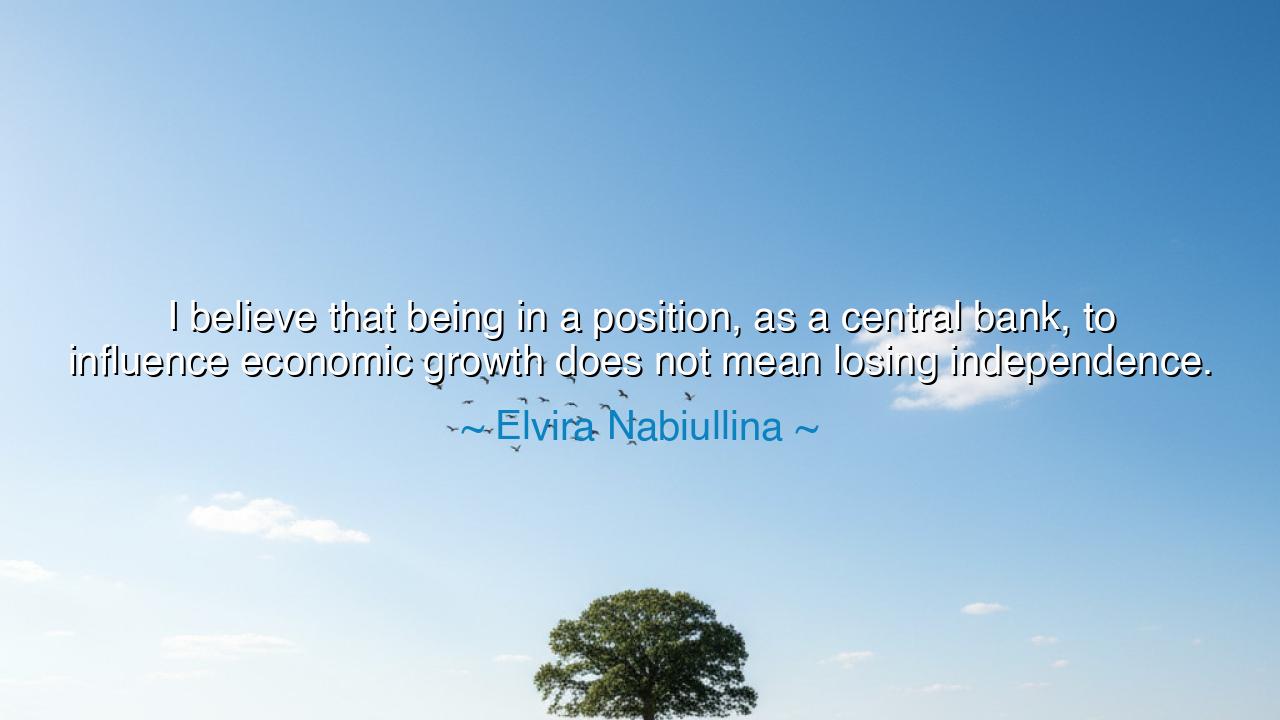
I believe that being in a position, as a central bank, to
I believe that being in a position, as a central bank, to influence economic growth does not mean losing independence.






Hear me, O future stewards of wisdom, for I bring forth a truth that resonates across time—a truth that speaks to the delicate balance between power and independence. In the words of Elvira Nabiullina, a woman of deep insight and resolve, we find a beacon for those who seek to understand the weighty task of guiding nations. She said, "I believe that being in a position, as a central bank, to influence economic growth does not mean losing independence." With these words, she offers a teaching for us all, a profound meditation on the nature of authority and autonomy.
Economic growth—this force that shapes the destiny of kingdoms and empires—has always been a source of both hope and peril. Those who control the levers of the economy hold the power to raise civilizations or bring them to ruin. Yet, in the hands of the wise, this power does not corrupt; rather, it is wielded with the care of a gardener tending to the fragile seeds of progress. Nabiullina speaks not of power in the form of tyranny but of stewardship—the responsibility entrusted to the central banks of the world to guide and nourish the economic spirit of a nation. She teaches us that the role of influence does not necessitate the loss of independence, but rather calls for a deeper, more refined kind of autonomy.
In ancient times, the Roman Republic was one such civilization that understood the fine art of maintaining both independence and influence. The Senate, the heart of Rome’s political system, held sway over the empire’s direction but operated under a delicate balance of power—knowing that too much control could lead to tyranny, while too little could lead to disorder. Similarly, the role of the central bank in the modern age is not to assert domination, but to guide the people with wisdom, ensuring that the nation's economy remains stable, resilient, and ever-growing. The power of economic influence, when properly stewarded, fosters growth without sacrificing the sacred independence of the people or the institutions.
Take heed, O children, for history teaches us that it is not the mere presence of power that leads to downfall, but the misuse of it. Elvira Nabiullina stands as a living testament to the notion that one can influence without becoming subjugated. Her leadership of the Bank of Russia amidst turbulent economic times has been marked by a steadfast commitment to independence—shielding the bank from external political pressures and focusing on what is best for the people. It is a leadership that understands that economic influence must be exercised with prudence, always mindful of the sacred trust placed in those who guide the nation's wealth.
In ancient Greece, Pericles, the great Athenian leader, was often lauded for his ability to lead while maintaining the integrity of the Athenian democracy. He recognized that influence, whether in the battlefield or the marketplace, could be used to uplift a nation rather than dominate it. Pericles knew that the greatness of Athens lay not in its ability to control all aspects of life, but in its wisdom to balance power with the freedom of the individual. Nabiullina’s vision mirrors this—her belief that economic growth and independence are not opposing forces, but rather two complementary forces that, when properly aligned, can create a prosperous and free society.
Thus, we are called to remember that the true nature of independence is not the absence of power, but the presence of wisdom. Economic influence, in the hands of the wise, does not lead to the enslavement of the people but to their empowerment. The central bank’s role, much like that of any governing body, is not to impose its will but to ensure that the forces of economy move in harmony with the will of the people. In this, true independence is preserved—not through isolation or stagnation, but through careful guidance and measured intervention.
What, then, is the lesson for us, O heirs of wisdom? It is this: Power is not inherently corrupting, but the misuse of power leads to decay. Whether in the chambers of government or in the depths of commerce, influence must always be balanced by independence. Like the central bank that shapes the financial destiny of a nation, so too must each of you wield your power with wisdom, with compassion, and with an unwavering commitment to the autonomy of all. Do not let the allure of control blind you to the importance of freedom. Strive, instead, to be stewards of that which you influence, guiding it toward growth, prosperity, and a flourishing of all.
And so, O future generations, I leave you with this counsel: Seek to influence not with the iron grip of force but with the gentle hand of wisdom. In your lives, whether in matters of state, economy, or personal conduct, understand that independence does not vanish with the presence of influence. Instead, it thrives when power is used for the collective good, never for domination. Be the guardians of freedom, and in doing so, shape a world where economic growth and independence walk together as two sides of the same coin, forever in balance.






AAdministratorAdministrator
Welcome, honored guests. Please leave a comment, we will respond soon